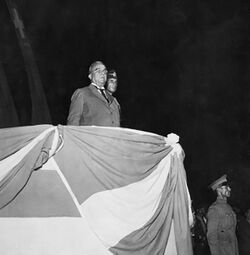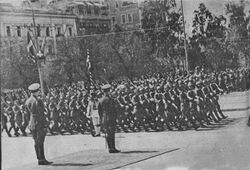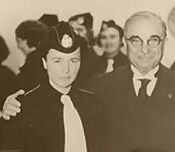Carlos Palmeira
The Most Honorable Carlos Palmeira | |
|---|---|
 Palmeira in 1925 | |
| Premier of Paretia | |
| In office 7 November 1925 – 29 September 1933 | |
| Monarch | Roberta II |
| Preceded by | Duarte Bonefacio |
| Succeeded by | Position abolished |
| Peer of Luzela | |
| In office 5 August 1919 – 7 November 1925 | |
| Preceded by | Caio Garcia |
| Succeeded by | Cézar Passos |
| Chairman of the New Nation of Paretia Party | |
| In office 16 February 1919 – 29 September 1933 | |
| Preceded by | Position created |
| Succeeded by | Joaquim Fidalgo |
| National Chief of the New Nation of Paretia Party and the 7th of November Movement Board | |
| In office 5 November 1925 – 29 September 1933 | |
| Preceded by | Position created |
| Succeeded by | Joaquim Fidalgo |
| Personal details | |
| Born | Carlos Suares Palmeira September 11, 1878 Felipieo, Luzela |
| Died | September 29, 1933 Precea, Luzela |
| Cause of death | Summarily Execution |
| Political party | New Nation of Paretia Party |
| Spouse(s) | Maria Teresa Coelho (1908-1915) Francisca Fraga(1922-1933) |
| Children | 3 Sotrina Irena Amílcar |
| Alma mater | University of Verlois University of Precea |
Carlos Palmeira (September 11, 1878 - 29 September, 1933), was a Paretian politician and leader of the Functionalist New Nation of Paretia Party. He served as Premier of Functionalist Paretia from 1925 to 1933. He was appointed Premier after he, Paretian military command, and Paretian monarch Roberta II staged a coup to overthrow democratically elected Xulio Sousa in 1925. He was leader of Paretia throughout the Great War alongside the Entente faction. In September 1933, when nearly all of Paretia was taken by Grand Alliance forces, he was captured by Etrurian troops and killed.
He would grow up researching other ideologies. He would serve in the military for 5 years and went to college. His first wife would die early on in 1915. He would later on begin to work on his political party, the New Nation of Paretia Party. He would support the Parti Populaire.
His party would grow in popularity and Roberta II would join them. He would eventually take over in 1925 after a coup in support of him brought him to power. It was known as the Eventos de Novembro and saw help from monarchist militias, nationalist police, and Gaullican forces.
He would create the 7th of November Movement, a functionalist government made up of the PNNP and it's allies. He would use groups like the Reservistas, Segurança, National Youth Organization and the military to enforce a totalitarian dictatorship that would see the rise of militarisation, industrialisation, and authoritarianism in Paretia. He would ally with Gaullica and when the Great War broke out supported them.
When Etruria joined the Great War in 1928 he would declared war on the Grand Alliance and shortly invade Etruria but were pushed back. He would use groups like the Reservistas as shock troops. Paretia would hold out from 1930-1932 but after the Battle of Chineta Paretia's forces were pushed back across the country, when Precea was being attacked Palmeira would be captured by Etrurian troops and summarily executed by them.
Early Life
Carlos was born on September 11, 1878 in Felipeio, Luzela, to a middle class family. His father, Henrique, was a lawyer who worked most of the time while his mother, Izabela, stayed at home. He was the oldest of his siblings. Carlos went to a local catholic school and in 1898 went on to study political philosophy at the University of Precea, here he studied the philosophies of various ideologies, including socialism, nationalism, and syndicalism. Here he became an early leader in the right-wing groups at the school, and eventually lead his own political actions organization that helped with right-wing campaigns, known as the Students for the Nation.
After collegee served in the military for 5 years from 1903 to 1908. He returned to work at the college and married his first wife Maria Teresa. She however would die of throat cancer in 1915.
During his time at the university he also wrote many papers on his political ideas, many of which would be considered early layout of the ideology of New Nationalism that his future political party would be based upon. He would also take trips to various countries, including Soravia, Werania, and Amathia. In 1918 he took notice of the Parti Populaire in Gaullica, and wrote that he was supportive of Rafael Duclerque and their ideals.
After his time in college he began to work on creating his own political party, alongside many of his friends, and came to fruition as the New Nation of Paretia Party in 1919.
PNNP Leadership
As the leader of the PNNP he began to make public speeches beginning in 1919, much of his speeches criticized the Paretian government and their handling of the Great Collapse, Valduvian Revolution, and many other pressing issues of the times. Many people would become supportive of him and saw him as a new voice, his party saw it's first victories in 1919 elections, and would see Palmeira gain a seat in the Chamber of Peers, but they did not win any seats in the lower house, making Palmeira the sole member of the PNNP in the Senade of Paretia.
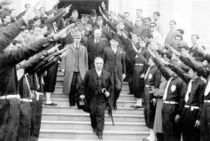
After the Parti Populaire took over in Gaullica, he would very be supportive of the new Functionalist government of Duclerque. He stated in 1920 that he believed that the right-wing was growing all across Euclea. In 1921 his party began to grow immensely in size, and he eventually created a militant wing for the party, though he had trouble trying to form it due to the blockages made by Premier José Monteiro and King Lourenço III to stop the rise of extremist functionalist and far-left parties. Palmeira's party saw the support of many well known figures, including religious leaders, businessmen, and the most notable, then Princess and heir Roberta. Roberta had become indulged in functionalism, and eventually met with Palmeira in 1921, and became close friends with him. Palmeira eventually met a close friend of Roberta, Francisca Fraga, who was well-known for being one of the first female train engineer in Paretia, he became very close with her and they eventually married in 1922. In October 1921 the death of Lourenço III lead to the rise of his daughter to the crown. Being a supporter of functionalism she attempted use her power to aid Palmeira on many occasions, but many of these were blocked by Premier Monteiro. In the 1922 election, the PNNP saw massive growth, becoming the 4th largest party in the country and won many seats.
Palmeira considered this to be a great victory for his party, and would expand his party's strength and eventually called for his members to stop the socialist SPIO. The election also saw the election Duarte Bonefacio to Premier, who was much more docile when it came to the PNNP, and did little to stop Roberta's policies and Palmeira's influence. Over the next months the PNNP had become very emboldened and began to hold counter-protests to disrupt the rallies of other parties. Palmeira became known as "O Chefe" by supporters.
In 1923 Roberta II would officially join the party, she then would become the leader of the women's section of the party and started holding rallies of her own in support of Palmeira. During this time an opposition of moderates, liberals, and democratic socialists, lead by Xulio Sousa, known as the Democratic Party of Paretia, would rise to popularity as opposition to the PNNP and SPIO.
Rise to Power
In 1924 Palmeira began to have PNNP rallies nearly constantly. Violence became a more common tactic in the party within the year before the election, the largest site of violence was in Burgo Coroa in 1924, where Palmeira held a rally at the same time as an SPIT rally, the insuing street brawl would kill over 130 people. After this event Premier Duarte Bonafacio arrested dozens of leading members of the PNNP's militant wing. Palmeira began to use rhetoric against Bonafacio's "anti-Paretian" government, further anger from the monarchy of Roberta II, and the military command lead to the eventually release of the arrested PNNP members. However the violence began to swing people away from the PNNP.
In 1925 the election was becoming extremely close between the PDP and the PNNP, violence began to escalate. The election was held in August and the PDP would come out just barely over the PNNP, Palmeira did not accept the results and claimed the position. Roberta II refused to appoint Sousa to Premier, however she eventually would when the Senado threatened to take away much of her powers in order to get Sousa in. Sousa would only be Premier for a short time.
On October On November 7th, 1925 the PNNP, its militant wings, pro-Palmeira military, and the monarchy lead a coup to oust Sousa from his office, known as the Eventos de Novembro, it saw massive Gaullican help, it was successful and many members of the PDP were arrested, members of other parties like the SPIO or AR-SRP would be executed. Sousa and many PDP members would be exiled by Roberta II to Etruria. Roberta II would then appoint Palmeira to Premier, Palmeira would ban all other parties and officially make Paretia into a functionalist state.
Palmeira would deal with resistance groups early on, mainly they were supporters of the PNNP that were in the military, or militant members of the SPIO. Palmeira would visit with and meet the functionalist leaders of Gaullica, including Rafael Duclerque and Constantin III. He declared Paretia to be an ally of Gaullica.
Premiership
The government was reformed as the 7th of November Movement. A broad movement that included traditionalists, monarchists, military officials, and catholic nationalists. His ally Alfonso Clemente would be made the leader of the movement. He would expand the Reservistas paramilitary in 1925 to include groups like the Obrigé militias.
He would form a secret police unit known as the Segurança, he would use them and the Reservistas to crush dissent in the country. He would have Rafael Azevedo become Interior Minister, he would greatly crack down on civil liberties in the country.
Clemente was assassinated by a leftist in 1927. Palmeira would be hurt emotionally from this, he would target many groups he considered "left-wing". He would also begin deportations of Etrurians, Rahelians, and Bahians.
One of the first policies of Carlos Palmeira was the creation of a sole legal trade union known as the Sindicato Unido de Paretia, which was meant to "harmonize" relations between the worker and the employer, which all were required to be a member of once employed, it was under full control of the state. All other trade unions were banned and dealt with swiftly by the government. The first policies of the syndicate was the passing of labor laws for workers, however it also banned striking, as well as restrictions on the firing of workers by employers.
The government would create mass public projects, mainly infrastructure and defense-oriented. Some of these smaller projects would be dealt with by the National Youth Organization, the sole legal mass youth movement in the country, which was directly correlated with the party. It came to have a major role in party politics, being one of the largest youth organizations in the world at the time.
The state of Palmeira maintained close relations with the Solarian Catholic Church during it's rule and pushed for the expansion of the influence of Catholicism in the country, however when the Great War broke out and Etruria joined the Grand Alliance, relations between the two became difficult. It would cut all government ties with Amendist religious groups that existed. The government would begin to repress smaller faiths such as Irfan, Badi, and Sapientianism. It would ban religious groups of these faiths as well as demolish their places of worship.
The Palmeira government greatly increased military funding as global tensions were on the rise, Palmeira's commanding military officers, such as General Ramón Serrato Andujar, would be tasked in the modernizing of the military, especially the navy and air force.
Palmeira would order the construction of a defensive line along the border with Etruria, known as the Palmeira Line, it was a long row of bunkers and fortifications in western Esmeira. Over 30 fortresses, and hundreds of defensive positions were set up along the border.
Palmeira would visit and form alliances with countries like Piraea, Amathia, Gaullica, Shangea, and Ardesia as global tensions were on the rise. He would support Roberta II's idea of a "functionalist world order" and called for a global functionalist world.
When the Second Sakata Incident occured in February 1927 and the outbreak of global war, he would declare war on the Grand Alliance and have Roberta II give a speech known as the War Against Democracy Speech, calling for a destruction of the "democratic plague".
Great War and Death
The war began with Paretian forces being sent to help Gaullica and Entente forces face Weranian and Estmerish forces, namely in Tsabara and Estmere. Paretia's role initially was small, but Etruria's attack on the Gaullican fleet in 1928 and entrance into the war would change this. Etruria was nearly surrounded by Entente forces but had a formidable force. Etruria followed this by invading southwest Esmeira, but their forces were quickly stopped during the Battle of the Palmeira Line, Palmeira's defenses proved successful early on. After this Etruria was pushed back to the city of Turania.
Paretia's Operation Teatro alongside Gaullican support would fail to capture the Etrurian city however during the Battle of Turania in 1929. Atrocities against Etrurians would be committed during the offensive, particularly the Bulaga Massacre. Operation Teatro's failure would lead to a change in leadership.
Paretian and Gaullican air forces would make numerous attacks on the island of Emessa south of Paretia. With much of Gaullica's fleet in the region destroyed, Paretia's naval force was heavily focused around Montecara. Etrurian forces would reverse the frontline again and push back into Esmeira by 1930 but were slowed down by Paretia's defenses and the war became slow, it became a stalemate. Palmeira would meet with generals of Paretia as well as Gaullican leadership for their next moves against Etruria.
Palmeira would become increasingly worried throughout 1931, as Etrurian forces began to reach the Espiesa River. Resistance against Palmeira began to become more organized with allied help and would begin to sabotage the war effort and assassinate leaders. Paretia lost air supiority over the country by 1932. Allied air forces began bombing campaigns in Gaullica and Paretia, Paretia's naval forces were practically depleted by the end of the year.
In 1932 the Battle of Chineta broke the Paretian lines permenantly, forces would begin to pushed back across the Deguitan plain. Espiesa and Teradad became the first major cities to fall to Etrurian forces. Palmeira would give a speech after Roberta II gave a decree for all able-bodied men to join the military. "I was correct in my prediction that this war was a war for our very existance as a nation, the Etrurians are entering a trap, our people will crush their armies before they reach the Aurean."
By late 1932 Ocerto fell and later so would Etimal, Etrurian forces broke through Paretian and Gaullican lines in the Aventines and began to conquer much of western Tosutonia, nearly encircling Paretian forces on the peninsula, by the end of the year Encerosa was captured and Precea had begun to be besieged by Etrurian forces. By September 1933 Palmeira would be in his bunker commanding forces with his high command, but many would run away during the battle, including his wife. He would then be captured by Etrurian forces who discovered the bunker and was executed without trial or knowledge of the Etrurian military high command.
Personal Life
Palmeira had two wives, Maria Teresa, who died early on in their marriage, but they had two children, Sotrina and Irena. His later wife, Francisca, would have one son, Amílcar.
His two daughters became involved in the 7th of November regime's National Youth Organization, both becoming high ranking members of the group. His younger daughter Irena later also involved herself with the Pérolitas paramilitary, and would see combat in the later part of the war, she was captured and killed by Etrurian troops in 1933.
His second wife, Francisca, became greatly unhappy with her marriage and ran away during Palmeira's final days during the fall of Precea. She would write down much of Palmeira's personal life in her memoirs. Palmeira's children who survived the Great War, Sotrina and Amílcar would both continue to live their lives following the war, but neither ever had kids. Palmeira today has no known living descendants.
Legacy
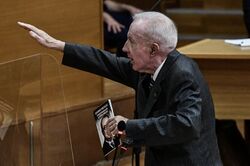
Like many functionalist leaders, Palmeira is infamous in his home country and abroad. In Paretia he is seen as the leader who brought the country into a dark totalitarian dictatorship that brought the country to rubble through war. However, despite this, he is often considered one of the most important leaders in Paretian history, as one of it's longest serving Premiers and leader in a crucial part of it's history, he is often ranked amongst the most important Paretian leaders in history.
In popular culture
Palmeira is deputed by actor Isaac Henriques Roque in the film Me and My Best Friend, which depicts the life of his second wife and Roberta's best friend, Francisca Fraga.
In the Gaullican film Rise of Duclerque, Palmeira makes an appearance during Duclerque's trip to Paretia, he is played by Jacob Badeaux
The TV miniseries Palmeira: Story of the Chief depicts the life of rule of Palmeira, he is played by Paulo Gama
Palmeira is depicted in the Rizean animated art film Dictators of the World

